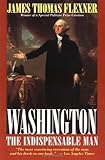

⬅ George Washington: Step-Children
it could well be concluded that the difficulty was not in her but in her husband. However, [Washington,] the magnificent athlete, who possessed in abundance every other physical prowess, could not altogether admit to himself that he was sterile. He believed, even when approaching old age, that if Martha died and he became remarried to a "girl," he might father an heir. In the meanwhile, his lack was a grievous one. 2aGiven the way the Custis children turned out SEE BELOW, Washington may have been lucky. The United States may have been lucky, too. The lack of an heir made it difficult to anoint Washington as King, which some elements favored at the time 3a. There is speculation that the lack of an heir made it difficult for Washington to accept an offer of Kingship 4a.
Washington's height, sterility, large hands, pockmarks, plus certain personality features and even his dental problems have led to the suggestion he had a syndrome associated with an XYY chromosome karyotype 4b. A geneticist concludes, however, "although there does seem to be a strong case that George Washington was affected with XYY syndrome, the evidence is just not conclusive" 4a. There are also speculations 5 -- dismissed by some 6 -- that Washington had Klinefelter syndrome, which is associated with an XXY karyotype. At least one historian believes that Martha was the cause of the marriage's childlessness 7, but his reasoning is unsupported and arrogant MORE.
Name Born Died Age at death Daniel Nov. 19, 1751 Feb. 19, 1754 2 Frances April 12, 1753 April 1, 1757 3 John (Jack) November 1754 Nov. 5, 1781 27 Martha (Patsy) December 1755 June 19, 1773 17
The medical histories of Patsy and Jack are extremely interesting.
Patsy
At the age of 12, Patsy was found to be epileptic. Her mother and step-father did everything possible for her and her illness. A companion her own age was found. She had a parrot, the finest clothes from London, a dancing master, and so on. And a doctor fitted her with an iron ring that was supposed to cure seizures 2b
Patsy died suddenly and unexpectedly during a seizure. Washington wrote his brother 2b:
[Patsy] rose from dinner about four o'clock in better health and spirits than she had appeared to have been in for some time; soon after which she was seized with one of her usual fits and expired in it in less than two minutes without uttering a word, a groan, or scarce a sigh. This sudden and unexpected blow ... has almost reduced my poor wife to the lowest ebb of misery.In modern medical parlance, Patsy had SUDEP -- sudden unexpected death during epilepsy -- a recently "discovered" syndrome of uncertain cause.
Jack
After Patsy's death, Martha became even more protective of her sole remaining child. Jack turned into an idle, spoiled, rich young "monster" 2b who sat out the Revolutionary War. As its culminating battle at Yorktown loomed, however, Jack could not resist the temptation to associate with aristocratic French officers preparing for the campaign. Jack assigned himself as a volunteer aide to Washington 2c.
Unfortunately, Jack had not been exposed to the infectious diseases common in the Army. He quickly became ill and quickly died 2c.
One more interesting note: Jack's grand-daughter married Robert E. Lee. Lee, of course, was the general who led the Confederate forces in the Civil War. During the war, the US Government seized Lees' home on the Potomac River and turned it into Arlington Cemetery. The main building at the cemetery is the "Lee-Custis mansion."
- Montgomery-Massingberd, Hugh (ed). Burke's Presidential Families of the United States of America. 2nd ed. London: Burke's Peerage Limited, 1981.
 a p.16 b pp.16, 24
a p.16 b pp.16, 24Comment: Maps -- in great detail -- the ancestors and descendants of American presidents through Ronald Reagan. They would have had an exhausting time with President Obama's family tree! MORE
- Flexner, James Thomas. Washington: The Indispensible Man. Boston: Little, Brown, 1974.
 a p.42 b p.43 c p.165
a p.42 b p.43 c p.165Comment: Distillation of Flexner's four-volume biography of Washington published from 1965 to 1972.
- Boller, Paul F. Jr. Presidential Anecdotes. New York: Oxford University Press, 1981.
 a pp.13-14
a pp.13-14 - Marion, Robert. Was George Washington Really the Father of our Country?. Reading, MA: Addison-Wesley, 1994.
 a p.72 b pp.41-74
a p.72 b pp.41-74 - Smith, MJV. The father who was not a father. Virginia Medical Monthly. 1976;103:14-16, 21-22, 33. Pubmed: 1106028.
- Amory JK. George Washington's infertility: why was the father of our country never a father?. Fertility and Sterility. 2004; 81: 495-499.
Comment: Reviews the differential diagnosis of Washington's sterility, and identifies genitourinary tuberculosis as the most probably cause. Fails to consider smallpox as a possible cause. Also identifies enteric tuberculosis as a possible cause of Washington's recurrent "dysentery," and expresses skepticism that he had Klinefelter syndrome.
- Harden B. First President's childlessness linked to disease. Washington Post. Feb. 29, 2004; A3.
